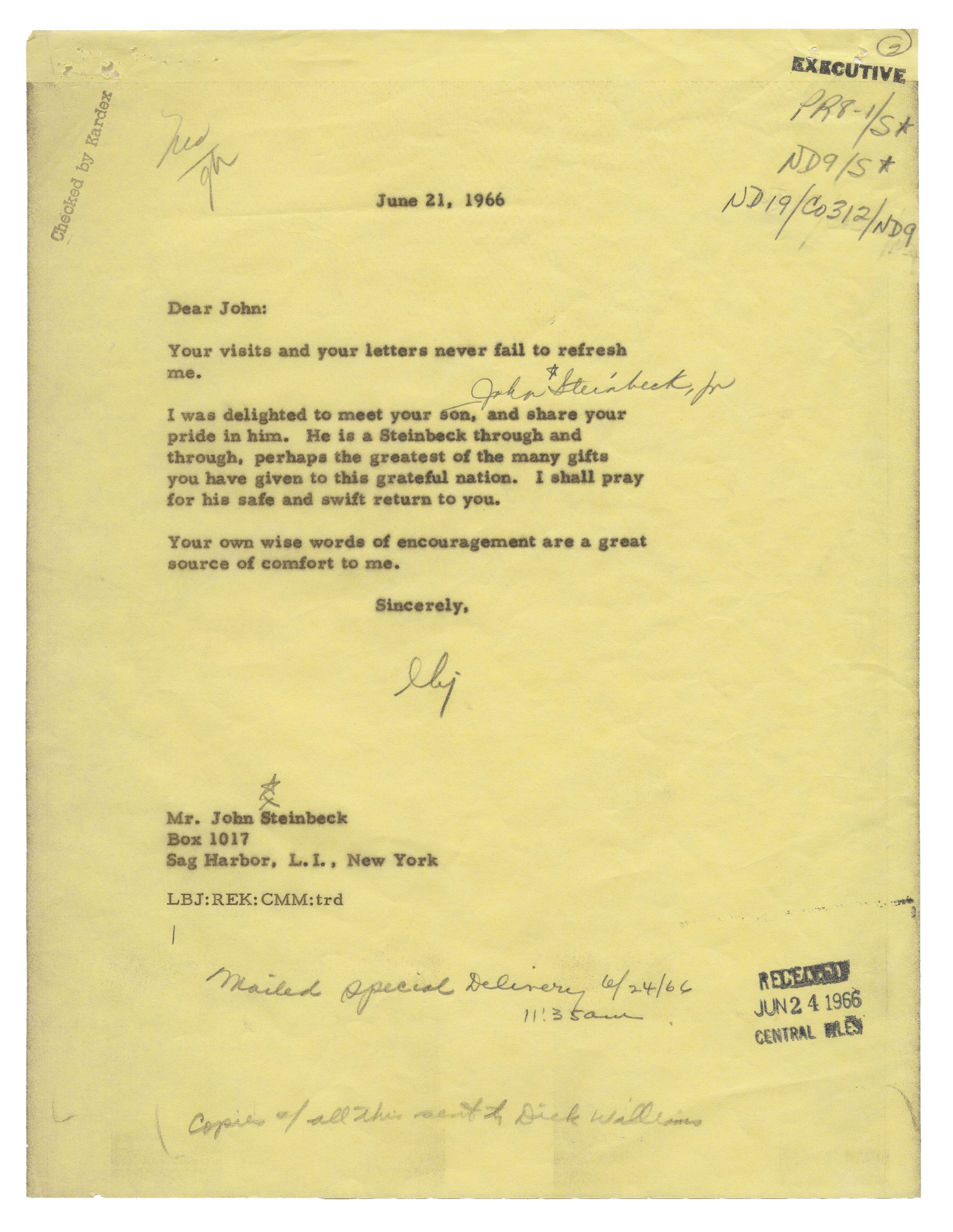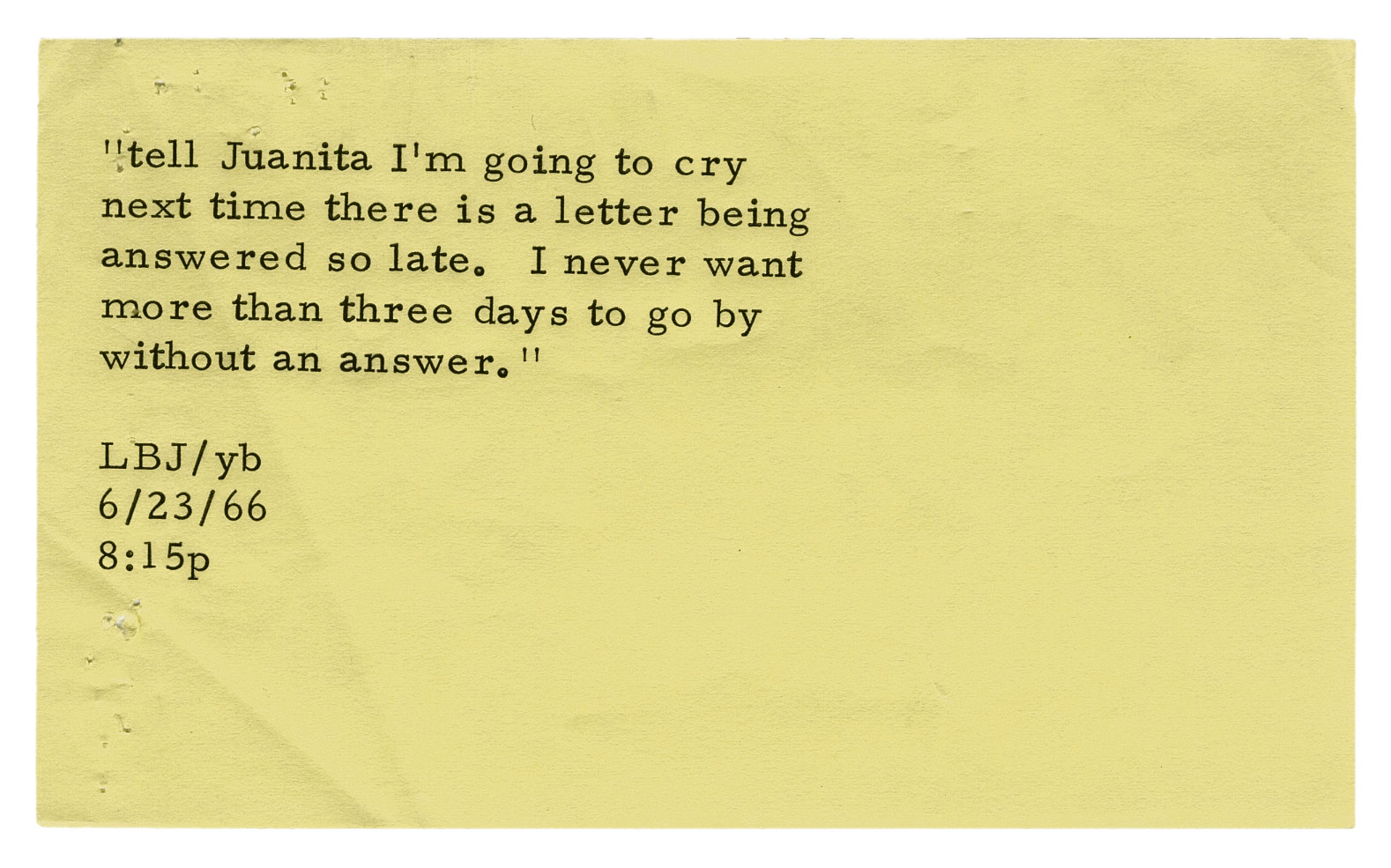
Letter from President Johnson to John Steinbeck
On Monday, May 16, 1966, John Steinbeck and his 19 year-old son, John, visited President Lyndon Johnson in the Oval Office of the White House. The brief meeting took place a few weeks after John, Jr. had completed basic training in the Army and a few weeks before his departure for Vietnam.
Although Elaine Steinbeck, John's wife, and Lady Bird Johnson had known each other years earlier when they both attended the University of Texas, the President and the Nobel Prize-winning author first met in late 1963 when the Steinbecks attended a private dinner at the White House. At that time, the couple had just returned from a trip to the Soviet Union and Eastern Europe that was part of the U.S. Information Agency's cultural exchange program and were in Washington, DC, for three days of debriefing by the State Department. The dinner at the White House was their opportunity to report directly to the President on their travels behind the Iron Curtain.
Following the dinner, a warm relationship developed between the two couples. In the summer of 1964, Steinbeck helped Johnson write his acceptance speech for the democratic nomination. In September of that year, LBJ conferred upon Steinbeck the Medal of Freedom. Throughout the Johnson administration, the Steinbecks were frequent overnight guests at the White House, and in the spring of 1966, at the request of his son, John Steinbeck asked the President for a favor—to make sure that his son would be given orders to go to Vietnam. In a July 1966 letter to his son, Steinbeck claimed it was the only request he ever made of the President and although he was not happy about making it, if he'd had to request that his son not be sent, he would have been "far more unhappy."
So in the spring of 1966, when Steinbeck contacted presidential assistant Jack Valenti to set up a meeting to introduce his son to LBJ, it was not out of the ordinary. According to the President's daily diary, the meeting lasted only four minutes, but it prompted Steinbeck to write a letter of thanks twelve days later.
In Steinbeck's single page note, typed in all uppercase letters on his personal stationery, he thanked the President for reassuring his son that "responsibility is behind him and backing him." He also asked the President to remember to pray for his son, and he included a paragraph offering the nation's leader encouragement in the face of demonstrations against his Vietnam policy. He asked the President to "remember that there have always been people who insisted on their right to choose the war in which they would fight to defend their country," and explained this statement through a number of historical examples.
He told the President that,
"there were many who would have no part of Mr. Adams' and George Washington's war. We call them Tories. There were many also who called General Jackson a butcher. Some of these showed their disapproval by selling beef to the British. Then there were the very many who denounced and even impeded Mr. Lincoln's war. We call them Copperheads. Then there were those who not only denounced but destroyed President Wilson's policy. Because of very special circumstances, we will not call them anything---for a while."
Finally, he assured the President that "only mediocrity escapes criticism."
President Johnson found a great deal of encouragement in these words, and sent a thank you note of his own on June 21, 1966, that is featured in this article. {Interesting documentary sidebar: In the correspondence file at the Lyndon Baines Johnson Library, there is a dictation note from the President to his secretary that reads "I am going to cry next time there is a letter being answered so late. I never want more than three days to go by without an answer."}
John, Jr. did serve in Vietnam, as well as Steinbeck's older son Thom. John Steinbeck himself reactivated his war correspondent's card and went to Vietnam and Southeast Asia with his wife for 5 months, between December 1966 and April 1967, as a correspondent for Newsday, a Long Island newspaper. In his "Letters to Alicia" column, he recorded his observations about the war, American GIs, the South Vietnamese, the President and his policies, and even offered the U.S. Government advice.
Through his own writings, Steinbeck revealed a variety of sentiments about the war. These began with doubt about U.S. involvement, then gave way to strong support (especially of the President and of American troops), and again returned to skepticism.
At the time that Steinbeck and his son visited the White House, he was a strong supporter of the President and his Vietnam policy. On his travels earlier in the decade with USIA to the USSR and Eastern Bloc nations, Steinbeck had witnessed firsthand how communism and totalitarian regimes prevented individual fulfillment. As a result of these experiences, he had become a staunch anti-communist and a strong defender of democracy and freedom. For these views, he was both harshly criticized and warmly praised.
Note: The document featured in this article comes from the Lyndon Baines Johnson Library in Austin, TX.
References
Benson, Jackson J. John Steinbeck, Writer: A Biography. Penguin Books: New York, 1984.
Hayashi, Tetsumaro. John Steinbeck and the Vietnam War (Part I). Steinbeck Monograph Series, No. 12, 1986. The Steinbeck Research Institute. The Department of English, Ball State University. Muncie, IN.
Steinbeck, Elaine and Robert Walsten. Steinbeck: A Life in Letters. The Viking Press, Inc.: New York, 1975.
The Documents

